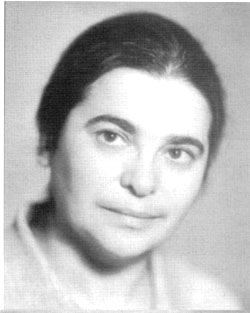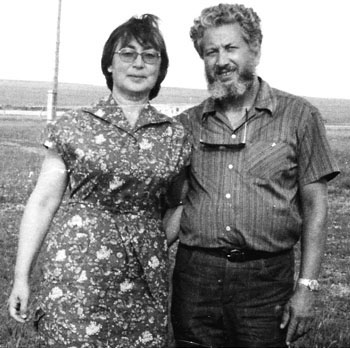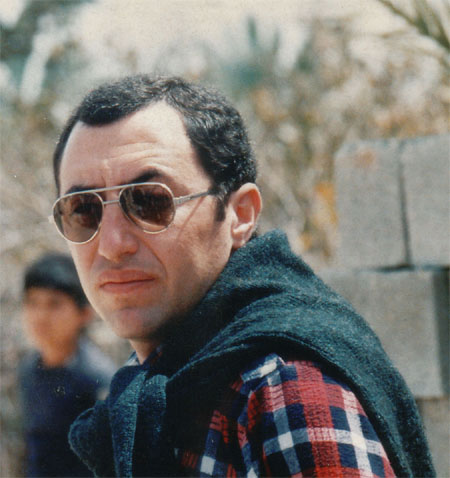
Ida Nudel
|
Ida Nudel was born in 1931 in Novorossiysk. Ida was brought up by her grandparents, who worked on a Jewish collective farm. From them she learned Yiddish. Ida's father was killed on the war, and she lived with her mother and a younger sister. Ida graduated from a university with a degree in economics and worked in different companies in Moscow and in the Urals. In 1970 she applied for the exit visa to go to Israel. Her mother has died by then, and her younger sister Elena with a family have soon received the exit visa . But Ida was not permitted to go, had been fired from her job and soon arrested and sentenced to the exile on charge in «malicious hooliganism». Her «hooliganism» consisted in that Ida has hung out in a window of her apartment a banner with the demand to release her to Israel. Ida continued her struggle, but she fought not only for herself. She gathered and filed the information about prisoners of Zion and transferred it to the West, corresponded with sympathising foreigners, sent letters of protests to the Soviet authorities. After a wave of protests in the West Ida's time in exile was reduced to four years. Her Moscow residence permit was nullified and she was sent to live in the city of Bendery in Moldova under the surveillance of KGB. But even there Ida continued her activity. The authorities answered with reprisals. An elderly woman whose health was undermined by prosecutions had to live in a barrack occupied by drunkards and petty criminals. Ida slept with a kitchen knife under the pillow. Ida's troubles ended on October, 15th, 1987 when she arrived to Israel. At the airport she was met by her sister, many former prisoners of Zion whom she sponsored, and Prime Minister Itzhak Shamir. She lives in Karmey-Yosef, helps new repatriates, especially single mothers. Although Ida does not have her own children, she fairly was named «mother of prisoners of Zion». Nathan Sharansky wrote that Ida «did everything to build a bridge across the abyss, separating the Gulag from the freedom».
From the book “Great Jewish Women” by Elinor and Roberta Slater.
|

Vladimir and Masha Slepak
|
Vladimir Slepak was born in 1927 in Moscow, in an assimilated family, though his mother came of an ancient rabbis stock. Masha Rashkovsky was born in 1926 in Moscow, also in an assimilated family. Vladimir and Masha got married in 1951. Vladimir graduated from Moscow Aviation Institute in 1950 and started working first at Moscow Electro-Lamp Factory, which produced also the military equipments, and later in a classified research institute. Masha graduated from the 2nd Moscow Medical Institute in 1953. When Vladimir was still working at the factory he and Masha met a group of Zionist-minded Jews and have accepted their ideas. The decisive turn in their minds occurred in 1967 (the Six-Day War), which led to increased communication with Moscow Zionists. In 1969 Slepaks received an invitation from Israel. Vladimir was dismissed from his work, and they tried to apply to OVIR for an exit visa to go to Israel, but because of various bureaucratic problems they were able to submit the relevant documents in 1970 only. Soon they received a "refuse", and that's how started their life as «refuseniks», in whose movement they and, in particular, Vladimir, took an active part. Vladimir repeatedly (not less than 10 times!) was arrested for 15 days for taking part in various actions of refuseniks. On June 1st 1978 Vladimir and Masha posted on the balcony of their apartment facing the Gorky street a banner with the words «Release us to our son of Israel» (one of their sons, who married a U.S. citizen, was able at that time to leave from the Soviet Union for Israel). Both were immediately arrested. Masha was sentenced to 3 years of imprisonment. Vladimir - to 5-year in exile to the village Tsokto-Hangil in Siberia. Masha voluntarily followed him. They were released in 1982, but only in October 1987 received the permission to leave for Israel. Now they live in Kfar Saba.
The information was provided by Vladimir and Masha Slepak. The photo was taken in the village of Tsokto-Hangil in 1980.
|

Simon Shnirman
|
He was born in 1957 in the town of Kerch in Crimea, in the family, followed some Jewish traditions, but Zionistically inclined. In 1959 Simon's parents applied for the exit visa to go to Israel for the first time, but were refused with all the consequences. In 1977, while living in Zaporozhye, where he has worked after the graduation a Metallurgical College, he filed the documents to leave for Israel, now by himself, and was also refused. In the same year, Simon began to make applications to various Soviet and foreign authorities and organizations to obtain the permission to go. At the same time, he tried to renounce his Soviet citizenship, and also failed to appear at the recruiting office when he received the draft papers. In 1978, after much persuasion and exhortations to abandon his intention, he was arrested and sentenced to 2.5 years of imprisonment for «Evasion from the service in the Soviet Army». After his release he returned to Kerch, in the next 2 years worked as a loader and took part in the Zionist activities - contacts and communication with foreign organizations and public figures, co-operation with colleagues and friends from other cities in the Soviet Union, receiving and distribution of Zionist literature and other materials. In 1983 he was arrested again and brought to the trial. He was accused of the distribution of Zionist literature and other materials, as well as other episodes of Zionist activity, but was sentenced to 3 years of high security imprisonment under the same article of the Criminal Code as the first time - for evading the military service. So he had become, apparently, the only prisoner of Zion, convicted twice for the same misdemeanor. While serving his time he was subjected to severe physical, mental and psychological punishments, went through dozens of prisons and camps in various parts of the Ukraine. Much of the time he spent in solitary confinement - punishment cells and dungeons. Repeatedly hold hunger strikes, one of which was a 6-day dry strike. In 1984 he received from a KGB official, signed by the District Prosecutor of Vinnytsa, a warning about prohibition of the collection of information in places of detention. In 1985 they open a new criminal case against Simon, this time for the repeated violations of the Prison Administration Code and the disobedience to Corrective Labor Institutions, and he was transferred from the camp to a prison. But a few months later, in a few days before the scheduled trial at which they intended to add another 2-3 years to his term, the case was closed "due to lack of evidence" after the situation with Simon was raised by Senator Dennis DeConcini, who headed the U.S. delegation to Moscow, at his meeting with Gorbachev. Simon was kept in captivity for 2 months more then the sentence time, then released, but for 1 year was kept under the administrative supervision. The last year, before leaving the Soviet Union for Israel, Simon lived in Kishinev; during this period he was one of the leaders in Zionist circles there. In 1987 he finally received the permission and left for Israel. In Israel he served in the Israeli army, graduated from the Faculty of Criminology and Sociology of one of the Israeli universities, has published several articles and letters on the current events. Lives now with his family in Haifa, works in law enforcement.
Information provided by Simon Shnirman. The photo was taken in 1988 in Israel.
|
|